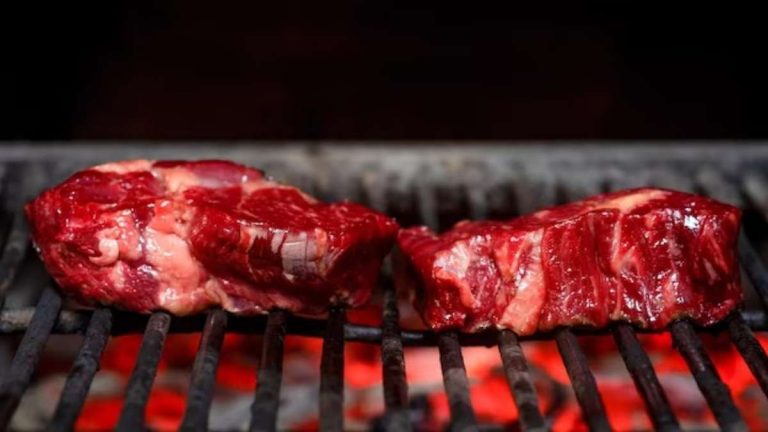Digestion is a complex process that our bodies undertake every time we consume food. Many people wonder how long it takes to digest different types of food, including steak. There are various theories and misconceptions surrounding the digestion of meat, with some suggesting that it takes days to digest and can sit in our guts, causing harm. In this article, we will explore the truth behind how long it takes to digest steak (How Long Does It Take to Digest Steak)and debunk any myths along the way.
How Long Does It Take to Digest Steak
Before we dive into the specifics of steak digestion, let’s briefly understand how the digestive system works. The journey of food begins in our mouths, where it is broken down into smaller pieces through chewing and mixed with saliva. From there, it travels down the esophagus and enters the stomach, where further breakdown occurs through the action of stomach acids and enzymes. The bulk of nutrient absorption occurs in the small intestine, which receives the partially digested food. Finally, the remaining waste makes its way to the large intestine and is eventually eliminated from the body.
Also read: what are the top 10 most healthy foods
The Digestion of Steak
Contrary to popular belief, steak does not take days to digest nor does it sit in our guts, rotting away. According to dietitian Fiona Carruthers, meat typically leaves the stomach within 2-3 hours and is fully digested within 4-6 hours. Our digestive system is well-equipped to handle the breakdown of meat and extract its valuable nutrients, such as iron, zinc, and B vitamins. It is important to note that the exact time it takes to digest steak (How Long Does It Take to Digest Steak) may vary slightly depending on factors such as the size of the steak and the individual’s digestive health.
Protein Digestion
Meat, including steak, is a rich source of protein. Protein digestion begins in the stomach, where it is broken down into smaller components called peptides by stomach acid and enzymes. These peptides then travel to the small intestine, where further breakdown occurs through the action of pancreatic enzymes. Ultimately, the peptides are broken down into individual amino acids, which can be absorbed by the body and used for various functions, such as muscle repair and hormone synthesis.
Satiety and Protein Foods
One interesting aspect of steak digestion is its impact on satiety. Protein-rich foods, including meat and fish, have been found to be more satisfying than starchy carbohydrate foods like bread and pasta. This means that consuming steak can help you feel full for longer periods of time. While the exact mechanisms behind this phenomenon are not yet fully understood, it is believed to involve the regulation of hunger hormones in the brain. So, if you’re looking to curb your appetite and stay satiated, including protein sources like steak in your meals may be beneficial.
The Role of Fiber and Fluids in Digestion
While steak is efficiently digested by our bodies, it is important to support the overall digestive process by ensuring an adequate intake of fiber and fluids. Because fiber makes stools more substantial and encourages regular bowel movements, it is essential for preserving a healthy digestive system. It can be found in various plant-based foods such as fruits, vegetables, and whole grains. Additionally, staying hydrated by drinking enough fluids, preferably water, helps keep the digestive system functioning optimally.
Tips for Optimal Digestion
To ensure smooth digestion of steak and other foods, here are a few tips to keep in mind:
- Chew thoroughly: Take the time to chew your food properly, allowing it to be broken down into smaller particles before swallowing. This aids in the initial stages of digestion and reduces the workload on your stomach.
- Incorporate fiber-rich foods: Include plenty of fruits, vegetables, legumes, and whole grains in your diet to provide the necessary fiber for digestion. These foods also offer a wide range of nutrients to support overall health.
- Stay hydrated: Drink an adequate amount of water throughout the day to prevent dehydration and maintain proper digestion. Aim for at least 8 cups (64 ounces) of water daily, or more if you engage in vigorous physical activity.
- Don’t rush your meals: Avoid eating in a hurry or while distracted. Take the time to enjoy your food and listen to your body’s hunger and fullness cues. Eating mindfully can aid in digestion and prevent overeating.
- Consider cooking methods: Opt for healthier cooking methods such as grilling, baking, or broiling when preparing steak. Avoid excessive use of oils or unhealthy fats, as they can slow down digestion and contribute to digestive discomfort.
- Listen to your body: Pay attention to how your body responds to different foods, including steak. If you notice any digestive discomfort or symptoms, such as bloating or indigestion, consider reducing your intake or exploring alternative protein sources.
Conclusion
The idea that steak (How Long Does It Take to Digest Steak) takes days to digest and sits in our guts is nothing more than a myth. In reality, meat, including steak, is efficiently digested by our bodies within a few hours. Our digestive system is well-equipped to break down the nutrients in steak and put them to good use. By incorporating fiber-rich foods, staying hydrated, and practicing mindful eating, we can support optimal digestion and overall health. So, enjoy your steak knowing that it will be digested and utilized by your body in a timely manner.
Disclaimer: This article is for informational purposes only and should not be considered medical advice (How Long Does It Take to Digest Steak). If you have specific dietary concerns or digestive issues, consult with a healthcare professional for personalized guidance.


